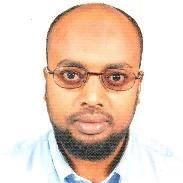
Murad Ridwan
Work place: School of Electrical and Computer Engineering, Addis Ababa Institute of Technology, Addis Ababa University, Addis Ababa, Ethiopia
E-mail:
Website:
Research Interests: Physics, Physics & Mathematics, Computational Physics
Biography
Dr. Murad Ridwan is from Ethiopia. Ha has obtained BSc in Electrical Engineering from Addis Ababa University (AAU), MSc and PhD degrees in Communication Engineering from the same university. He has worked as a satellite base-station and systems engineer and later on as multimedia engineer in satellite communication, Ethiopian telecom. Currently, he is an academic staff at the School of Electrical & Computer Engineering, Addis Ababa Institute of Technology, AAU. His research interests lie primarily in the area of antennas, antenna arrays, beamforming, precoding techniques especially for 5G, electromagnetism, numerical electromagnetics, quantum mechanics and particle physics. He has published several papers. He loves strength exercises, likes playing with mathematics, reading on science, philosophy and religion.
Author Articles
A Review of Quantum Computing
DOI: https://doi.org/10.5815/ijmsc.2022.04.05, Pub. Date: 8 Oct. 2022
Quantum computing is a computational framework based on the Quantum Mechanism, which has gotten a lot of attention in the past few decades. In comparison to traditional computers, it has achieved amazing performance on several specialized tasks. Quantum computing is the study of quantum computers that use quantum mechanics phenomena such as entanglement, superposition, annealing, and tunneling to solve problems that humans cannot solve in their lifetime. This article offers a brief outline of what is happening in the field of quantum computing, as well as the current state of the art. It also summarizes the features of quantum computing in terms of major elements such as qubit computation, quantum parallelism, and reverse computing. The study investigates the cause of a quantum computer's great computing capabilities by utilizing quantum entangled states. It also emphasizes that quantum computer research requires a combination of the most sophisticated sciences, such as computer technology, micro-physics, and advanced mathematics.
[...] Read more.Other Articles
Subscribe to receive issue release notifications and newsletters from MECS Press journals